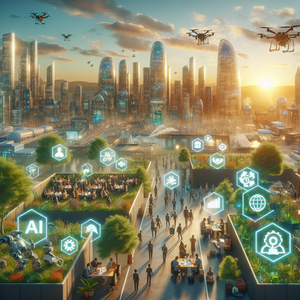Future-Proofing Your Career in the Age of AI

AI is not merely a disruptive force; it is a transformative one. Industries are harnessing AI to enhance efficiency, reduce costs, and improve service delivery. While certain roles may vanish, others are evolving, creating new opportunities for individuals willing to adapt. The key to navigating this transition lies in understanding the skills and capabilities that will remain in demand. As AI takes over routine tasks, human-centric skills will become invaluable, emphasizing the importance of positioning oneself strategically to leverage new opportunities while mitigating the risks of job displacement.
Key Skills for the Future
As AI systems automate routine tasks, the demand for human skills in creative and strategic thinking is on the rise. Employers are increasingly seeking individuals who can analyze complex problems and develop innovative solutions. For example, roles in management, consulting, and strategic planning require strong critical thinking skills to navigate the complexities of modern business environments. A case in point is the growing emphasis on data-driven decision-making, where professionals who can interpret and act on data insights will be in high demand.
Emotional Intelligence (EI)
While AI can process data and execute tasks, it lacks the ability to understand human emotions or build interpersonal relationships. Emotional intelligence—which encompasses empathy, self-awareness, and effective communication—will become a critical differentiator in the workplace. Professions in healthcare, education, and human resources, where human interaction is key, will find that EI is an indispensable asset. For instance, mental health professionals must possess strong emotional intelligence to connect with patients and provide effective care.
Tech Proficiency
Familiarity with AI tools and technologies will be essential across all sectors. Understanding how to leverage technology enhances productivity and makes professionals more adaptable in their roles. For example, marketers who can analyze consumer data using AI-driven analytics tools will have a competitive edge over those who rely solely on traditional methods. Similarly, those who can harness automation tools to streamline processes will be better positioned to succeed.
Emerging Fields Less Likely to be Automated
The healthcare sector is experiencing a surge in demand for professionals who can provide personalized care and innovative treatments. Roles such as genetic counselors, telehealth providers, and mental health specialists are expected to grow, driven by the need for human compassion and understanding. For instance, the rise of telemedicine has created new opportunities for healthcare providers to connect with patients remotely, emphasizing the human touch in medical care.
Sustainability and Environmental Science
With growing awareness of climate change and sustainability, careers in renewable energy, conservation, and sustainable agriculture are becoming increasingly relevant. Professionals in these fields will be tasked with addressing complex environmental challenges, making human insight and creativity indispensable. The shift toward sustainability will require innovative solutions that AI alone cannot provide, emphasizing the need for human involvement.
Education and Training
Given the rapid pace of technological change, there is a burgeoning need for continuous learning and upskilling. Educators and trainers who can effectively teach AI and technology-related skills will be crucial in preparing future generations for a tech-driven world. As companies prioritize employee development, roles in corporate training and development will also see significant growth.
Strategies to Future-Proof Your Career
Commit to continuous education by taking online courses, attending workshops, or pursuing certifications in your field. Platforms like Coursera, Udemy, and LinkedIn Learning offer a plethora of resources that cater to diverse interests and professions. Keeping your skills up to date will enhance your employability and adaptability.
Network and Collaborate
Establishing a robust professional network can open doors to new opportunities and collaborations. Attend industry conferences, join online forums, and connect with peers on platforms like LinkedIn to stay informed about trends and developments in your field. Networking not only helps with job opportunities; it also fosters knowledge exchange and idea generation.
Embrace Change and Adaptability
Cultivating a mindset of flexibility and openness to change will serve you well in an unpredictable job market. Being willing to pivot and explore new roles or industries can lead to unexpected and rewarding career paths. Embracing change rather than resisting it allows for continuous growth and development.
The rise of AI presents both challenges and opportunities in the job market. By focusing on developing essential skills such as critical thinking, emotional intelligence, and technological proficiency, professionals can position themselves to thrive in this new era. Additionally, exploring emerging fields and committing to lifelong learning will enhance one’s ability to navigate the complexities of the future of work. While the landscape may be changing, those who embrace these strategies will not only future-proof their careers but also contribute to a more innovative and resilient workforce. In an age of AI, adaptability and continuous learning are not just advantageous—they are essential.
Data Analyst with AI Specialization
Tech companies like Google, financial institutions, and consulting firms
Core Responsibilities
Analyze complex datasets to derive actionable insights that guide business decisions.
Collaborate with cross-functional teams to implement AI-driven data solutions and tools.
Develop and maintain dashboards and reporting tools to visualize data trends.
Required Skills
Proficiency in data analysis tools (e.g., SQL, Python, R) and visualization software (e.g., Tableau, Power BI).
Strong understanding of machine learning algorithms and their applications.
Exceptional problem-solving skills to transform data into strategic recommendations.
Human-Centered AI Designer
AI startups, tech giants, and product design firms
Core Responsibilities
Design intuitive user interfaces for AI applications that enhance user experience.
Conduct user research and usability testing to inform design decisions.
Collaborate with developers to ensure that design concepts are implemented effectively.
Required Skills
Strong background in UX/UI design principles and tools (e.g., Sketch, Adobe XD).
Knowledge of human-computer interaction and user experience methodologies.
Ability to balance technical constraints with user needs and preferences.
Telehealth Coordinator
Hospitals, telehealth companies, and healthcare organizations
Core Responsibilities
Manage and facilitate virtual health consultations between patients and healthcare providers.
Ensure compliance with telehealth regulations and patient privacy standards.
Analyze patient feedback and health data to improve telehealth services.
Required Skills
Strong communication and interpersonal skills to interact with diverse patient populations.
Familiarity with telehealth platforms and healthcare technology.
Critical thinking skills to address and resolve patient issues effectively.
Sustainability Consultant
Environmental consulting firms, NGOs, and corporate sustainability departments
Core Responsibilities
Assess and advise businesses on sustainability practices and policies to reduce their environmental impact.
Conduct sustainability audits and develop action plans for improvement.
Stay updated on environmental regulations and emerging sustainability technologies.
Required Skills
Knowledge of environmental science and sustainable practices.
Strong analytical skills to evaluate energy use and resource efficiency.
Excellent communication skills to present findings and recommendations to stakeholders.
Corporate Learning and Development Specialist
Corporations, educational institutions, and training consultancies
Core Responsibilities
Design and implement training programs that enhance employee skills in emerging technologies and AI tools.
Assess training needs and evaluate the effectiveness of development initiatives.
Collaborate with subject matter experts to create engaging learning materials.
Required Skills
Strong understanding of adult learning principles and instructional design.
Proficiency in e-learning software and Learning Management Systems (LMS).
Excellent facilitation skills to engage and motivate learners.


